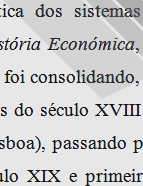

................................
Finally, in vol. V (Id., Idem, pp. 287-316), he addresses the "Financial Situation of the State and the National Economy," the "Population," and "Economic Activity" (agriculture, industry, mines, taxes, currencies, and commerce). Despite the relevance of these approaches, the issues are underdeveloped. The author's death in 1933 prevented him from continuing his work on the subsequent historical periods. This task was taken up by the director of the work, Damião Peres (1889-1976). In volume VI (pp. 363-418), which retained the title of the previous volumes ("Organização económica"), he analysed "Population," "Currency," and "Economy." In volume VII (pp. 607-656), he similarly focused on "Population," "Currency," and "Economic Life," "up to and after the Regeneration." Despite the merit of this monumental História de Portugal, the analyses of economic history are overly succinct, conducted in traditional moulds, with the well-known limitations present throughout the work: the prioritisation of the political component over economic aspects and the near absence of references to the sources and bibliographies used. This decade (1930s) has been referred to as the "black years of Salazarism," a period marked by a crisis in historiographical production (Francisco Falcon, "Historiografia Portuguesa Contemporânea," 1988, pp. 38-39). However, albeit slowly and with some time lag, in the subsequent decade, new 'winds' of historiography—with the rise of new history and the importance it placed on economic and social history—began to reach Portugal. This is evidenced by two initiatives taken at the end of the decade. One occurred within the scope of the National Assembly and the other at the Faculty of Letters of the University of Coimbra.
In the first case, the leading figure was Artur Águedo de Oliveira (1894-1978). With a degree and Ph.D. from the Faculty of Law of the University of Coimbra, he held various positions (Carlos Bastien, "Artur Águedo de Oliveira (1894-1978)," 2001, pp. 232-234). He travelled to several countries (Spain, Italy, Germany, England, the United States, Brussels, Rio de Janeiro, and Austria), and these travels were beneficial to his research (Maria Alcina dos Santos, Elites Salazaristas Transmontanos...[Trás-os-Montes Salazarist Elites] (1894-1978), 2011, pp. 30 and 46). He is the author of several works including Portugal Perante as Tendências da Economia Mundial [Portugal in the Face of World Economic Trends ] (1947) and Finanças Verdadeiramente Nacionais[Truly National Finances] (1955), though none are of significant relevance to economic history.
